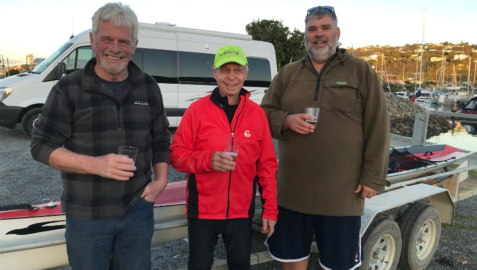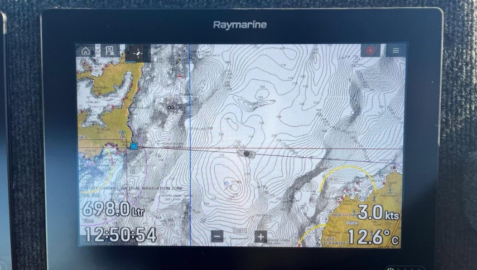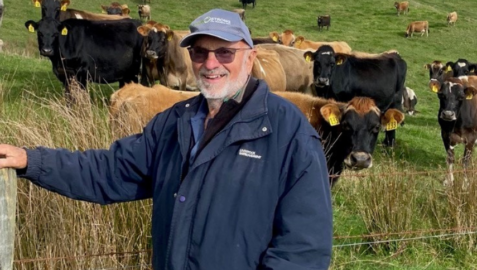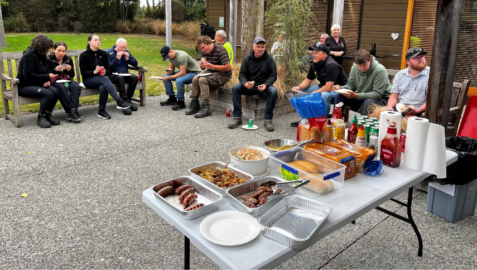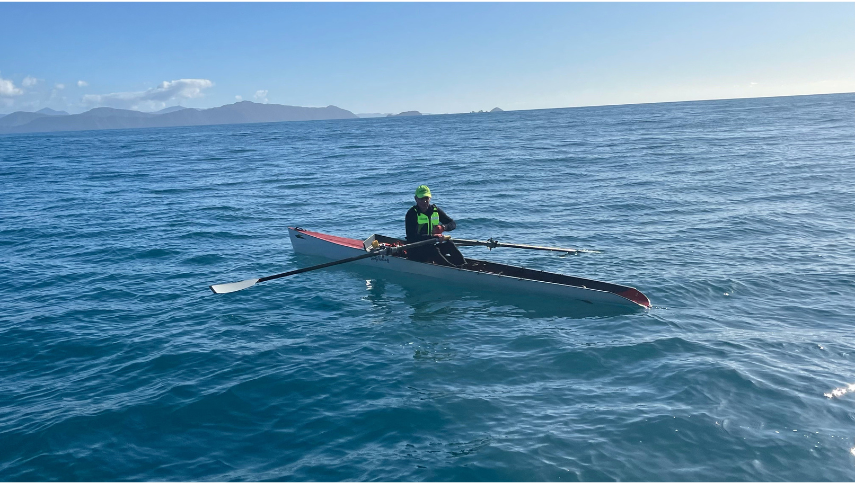
One stroke at a time
Module Overview
After a lifetime on the grass, Wairarapa farmer Jamie Strang decided to hit the water and row Cook Strait to raise funds for Farmstrong. Here’s how he went.
Why on earth did you decide to row Cook Strait at 76? It’s one of the most demanding stretches of water in the world.
When I was 50, I rode my bike from North Cape to Bluff. I completed it in sections over a couple of years while I worked on the farm. Somehow it came up again in conversation one day and someone said, ‘Jamie, you haven’t really completed the whole thing. You haven’t gone across Cook Strait.’ That’s where it came from.
It was unfinished business?
Yes, I guess [laughs].
Tell us about your farming background.
I’ve lived in the Gladstone Valley most of my life and farmed there for 51 years. We’ve leased the farm now but we still live on it and just love being part of it.
Why did you decide to raise money for Farmstrong?
I’ve been involved in judging the Ballance Farm Environment Awards since they began. We do a lot of on-farm judging, so we travel the country, talk to lots of people and so I know Farmstrong is doing good things supporting farmers through some challenging times.
We all know it’s tough times at the moment in our own communities, whether it’s the weather or prices, and Farmstrong appears to me to be doing something positive about it, taking care of people, helping them find ways to get through.
How do you prepare to row Cook Strait? Even the ferries struggle at times.
Two years ago I bought a Swift offshore rowing boat from Sally Knight in Nelson, got it back home and for a while it just sat behind my house because I didn’t know how to row! Eventually I took it up to a little hydro dam between two farms about 10 minutes’ drive from me. The dam’s about half a kilometre long. So if I wanted to do a kilometre of rowing, I had to do one up and one back. That’s what I did.
Who taught you to row?
YouTube. To get going, I just looked at a lot of YouTube stuff which is why I’m not a very good rower. But I got better by doing lots of rowing on that lake which was sometimes windy and sometimes smooth. I spent so long there I saw two generations of swans being born and little ones come out and paddle around me and then finish up each year flying off. I watched the local farmers do their farming from season to season because I was there most weeks. It made me appreciate just how beautiful our rural landscape is.
Admiring the local bird life still sounds like a long way from conquering Cook Strait. When did you know you were ready?
To prove I could paddle that far in one go I rowed the length of Lake Taupo first. When I did that ok, it that gave me the mental strength to know that I could actually do it. But then I couldn’t find anyone to pilot me across the strait, so that delayed everything a year. That turned out to be a blessing, because if I’d tried to do it a year ago I don’t think I would have been fit enough.
So you got fitter, watched more swans and then gave it a nudge?
Yes, my wife Marilyn who’s put up with all this for two years and my family came down with me and I set off from Makara on the Wellington coast. They’ve provided incredible support.
What were the conditions like?
It was freezing in Makara Valley but there was a calm sea. There was nothing breaking on the shore. We easily pushed the boat down, rigged it and launched. I just paddled a couple of strokes and the wind just quietly blew me out in this beautiful smooth water. I thought to myself, ‘This is no trouble, I’m going to blow this over!’ Then the pilot turned up and said, ‘You’re not even in the straits yet, Jamie.’
Ok, a reality check. So what was it like in the strait?
There was this huge swell running. It was about one and a half to two metres. It was constant all day and it felt big to me bobbing out there in my little boat. There was also little bits of chop coming from this direction and that direction. The only thing that saved me on the day I reckon was there was no wind.
What was the toughest part?
I was going fine until the tide turned with only 3k to go. Suddenly there was chop everywhere and the water seemed to boil under me. At that point I wasn’t making much headway. It was a real struggle.
On the hydro lake back home in good conditions, 1k took me about 120 strokes. But I reckon it took me about 5,000 strokes to get across the strait because the water was so choppy a lot of them were only half strokes. The water was shifting all the time so it was difficult to get both oars in the water. Your concentration levels had to be high.
What got you through?
I was just really focused on what I was doing. I didn’t let any sort of panic or doubt enter my mind. At that point I realised my mental strength was as important as my muscle strength. I’d also confirmed in my mind beforehand that I could do it because I’d done all the hard yards and the prep. That meant I could just focus on the challenge. All I had to do was just get in there, keep believing and keep rowing.
Sounds like you had the right mindset to pull it off.
Absolutely, I’m a great believer that a positive attitude is vital whether you’re farming or rowing Cook Strait. After I’d finished, the skipper said to me, ‘Do you realise you never looked over your shoulder to see how far away you were from the finish?’
I told him I deliberately did that because I realised I was going to get disappointed if I looked over my shoulder and we were still miles away, so I didn’t look.
I just focused on the little things, the shape of the waves coming at me, keeping my balance, one stroke at a time. And the next thing I knew, I’d rowed 30ks in 4 hours and 45 minutes.
Looking back on your farming career, do you have any advice for people doing it tough on farm at the moment?
Spend some time off the property, particularly with other people. Go and have a coffee and a yarn with someone once a week. Get good people around you. Talk about what you’re doing on farm.
I was one of those farmers who never used to take breaks. But once I started coaching rugby, making time to go to practices and games, it made me realise getting off farm was essential. It made a huge difference to how I felt and how well the week went. After that I made sure I took regular breaks with my family to recharge the batteries.
What’s the old cliche? If you want to go fast, go by yourself. If you want to go far, go with other people.
Farmstrong is a rural wellbeing programme that helps people manage the ups and downs of farming. Last year 14,000 farmers attributed an increase in their wellbeing to the programme. You can get behind Jamie and his amazing work for Farmstrong by donating here:
https://givealittle.co.nz/fundraiser/be-part-of-jamie-strangs-epic-journey-to-support
